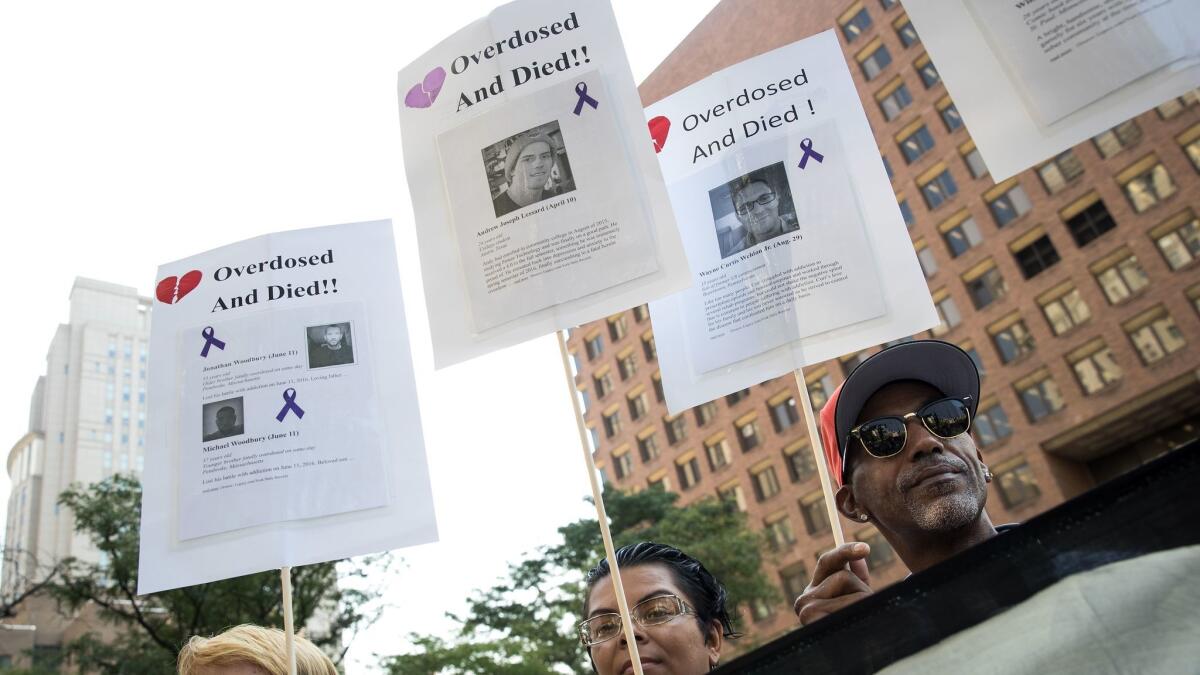Opinion: Please Mr. President, don’t criminalize opioid addicts as part of emergency response

- Share via
Opioid addiction is officially a national emergency. Or it at least it will be once the paperwork gets done, President Trump said Thursday.
This is a notable departure from just two days earlier when, during a “major briefing” (his words) on the opioid crisis, the president conspicuously said nothing about declaring a national emergency — despite the fact that it was the main recommendation from his own opioid commission’s first report issued the week before.
Trump focused instead on stepping up law enforcement and border security, leading many to fear he is more interested in a taking an old-school “war on drugs” approach than treating the epidemic appropriately as a public health issue and addicts as people who are sick.
In fact, there was nothing major about the president’s opioid briefing, except for the part in which he offered the now-infamous “fire and fury like the world has never seen” quip regarding North Korea’s nuclear capabilities. In that moment, everyone forgot what the briefing was originally about. Potential nuclear annihilation has a way of doing that.
Perhaps President Trump forgot what he said, too, or maybe the emergency declaration was already in the works. In any case, assuming he follows through, a declaration could help speed funding and cut red tape for what will hopefully be a holistic and forward-thinking response.
The LA Times’ editorial board has some suggestions for the feds and states on how to do this:
- First and foremost, do not treat this as a law enforcement problem. The nation’s “war on drugs” was an expensive failure that didn’t stop drug abuse. It just filled up jails and ruined lives. Let’s not repeat that mistake.
- In that same vein, please don’t criminalize addicts. Help them. Especially if they are pregnant women.
- Fund treatment centers. LA Times intern and West Virginia native Cassady Rosenblum was dismayed by the lack of discussion of treatment centers in the report issued earlier last month by the President’s Commission on Combating Drug Addiction and the Opioid Crisis.
- Support efforts to equip all police officers with Naloxone, a drug that reverses opioid overdoses, and other harm reduction efforts, such as safe injection sites where addicts can shoot up safely.
- Support legislation that puts time limits on opioid prescriptions for acute pain, such as the bipartisan Opioid Addiction Prevention Act by Sens. Kirsten Gillibrand (D-New York) and John McCain (R-Arizona). Research indicates that most people prescribed opioids after surgery don’t use all of their pills but also don’t dispose of them, increasing the potential they will be misused by others.
- And for heaven’s sake, do not cut Medicaid. It’s is one of the most important sources of funding for drug addiction treatment.
Follow me @marielgarzaLAT
More to Read
A cure for the common opinion
Get thought-provoking perspectives with our weekly newsletter.
You may occasionally receive promotional content from the Los Angeles Times.










